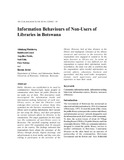Information behaviours of non-users of libraries in Botswana

View/
Date
2010Author
Mutshewa, A. et al
Publisher
Archlib and Information Services, http:/www.hwwilson.com/journals; http://www.ajol.infoType
Published ArticleMetadata
Show full item recordAbstract
Public libraries are established to be used by communities. Surprisingly, many people in communities where there are public libraries do not make use of them. This descriptive study investigated the information needs and information-seeking behaviour of such non-library users, so that the libraries could
redesign their services to attract them. Also examined are the barriers encountered by non-library users in getting information, their reasons for not using the library, and their perceptions on current outreach efforts by libraries in the
communities. The target population for this study was the community of non-library users in
Botswana. The snowball sampling method was used to select 302 respondents from 34 research sites in the country. The findings indicated that respondents knew about the existence of the
library through friends, Kgotla meetings, and
advertisements in local media, and they were also
willing to participate in the activities of the library. However, lack of time, distance to the
library and inadequate relevance of the library resources and services to the activities the
respondents were engaged in seemed to be the main barriers to library use. In terms of
information required, it was difficult for the
respondents to express their information needs;
nevertheless, the study was able to establish that the respondents often needed information on current affairs, education, business and agriculture, and they used radio, newspapers,
friends, work supervisors and personal experience to meet their needs.
